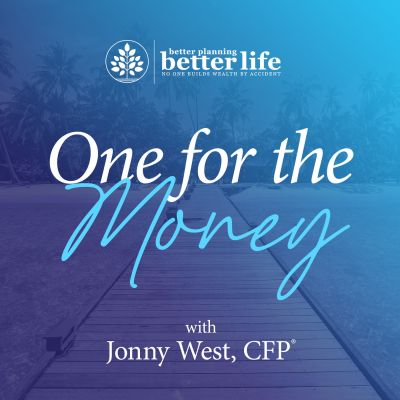Listen to hear Jonny break down the tips, tricks, and strategies he uses to help clients retire early. This is the "easy button" when it comes to early retirement because everything you want and need to know is right here. Jonny will lay it all out in plain English so you can get the details on the actions you can do to put yourself on the best path to early retirement. He'll also interview top real estate, tax, and estate planning and other professionals to provide a comprehensive approach to your retirement planning. Nobody builds wealth by accident. Listen to find out how you can do it on purpose.
https://one-for-the-money.captivate.fm
episode 13: The Psychology of Money
In today’s episode, I’ll be sharing thoughts from a personal finance book that I read last summer. Morgan Housel, a former columnist at The Motley Fool in the Wall Street Journal, wrote the book entitled The Psychology of Money. In it, he shares the idea that intelligence isn’t what makes someone good with money; behaviors are what play the most significant role. Listen to learn what these behaviors are and how you can benefit from them.
In this episode...- Intelligence vs. behavior [01:13]
- Investment bias [05:41]
- What is happiness? [08:26]
- Lessons from a gerontologist [09:39]
- Lifestyle and budgeting [12:01]
Behaviors make the difference
In 2020 Morgan Housel wrote a book called The Psychology of Money. The book’s premise is that doing well with money has little to do with how smart you are and a lot to do with how you behave. If a genius loses control of his emotions, that can create a financial disaster. The opposite is also true. Ordinary people without financial education can become wealthy if they have a handful of behavioral skills. Someone who makes a lot of money can be poorer than the man sweeping floors. The difference comes down to lifestyles and how they utilize what they have.
Emotional financesHealth and money are two things that impact everyone. Despite this similarity, we’ve seen a divergence in the outcomes. While health has improved for centuries and made remarkable advancements in improving people’s lives, financial advances haven’t. The extensive research hasn’t made us better investors or savers because money is far too emotional. A consumer finance survey found out that people’s lifetime investment decisions are heavily anchored to their experiences in their generation, especially experiences in early adulthood.
If inflation was high, people invested less in bonds throughout their lifetime. If the stock market was strong, they invested more in stocks. That was true for me because I started investing in the late 90s at the start of the dot-com era. I still invest heavily in stocks, albeit differently than I did then. Before, I purchased single stocks hoping they’d outperform. Now I use evidence-based research and invest in broadly diversified portfolios.
Prioritizing expenses and reducing wastePeople strive to get a couple of percent higher returns. Meanwhile, what they could benefit from is reducing lifestyle bloat. The tip here is to review expenses regularly to see if they make sense. According to a recent study, adults in the US spend nearly $1,500 a month on non-essential items. That’s roughly $18,000 a year on things we probably don’t need. That’s a lot of money, considering how much Americans are letting their savings and other crucial goals fall by the wayside.
The same study found that 58% of people believed that there were important things they were unable to afford, including retirement savings and life insurance. There’s nothing wrong with enjoying a few luxuries here and there to make life enjoyable. But unfortunately, Americans are spending a small fortune on things that take away their opportunity to save for the future or protect their families with life insurance. The good news is that examining our budgets and reducing waste will help us prioritize those important things for our families and us.
Resources & People Mentioned- The Psychology of Money: Timeless lessons on wealth, greed, and happiness
- When it Comes to Early Retirement - Start with Why, Ep #1
- Meaning & Purpose in Retirement, Ep #6
- The Average American Spends Almost $18,000 a Year on Nonessentials | The Motley Fool
Connect with Jonny West
- https://BetterPlanningBetterLife.com
- Connect with Jonny on LinkedIn
Subscribe to ONE FOR THE MONEY on
Apple Podcasts, Spotify, Google Podcasts
Audio Production and Show notes by
PODCAST FAST TRACK
